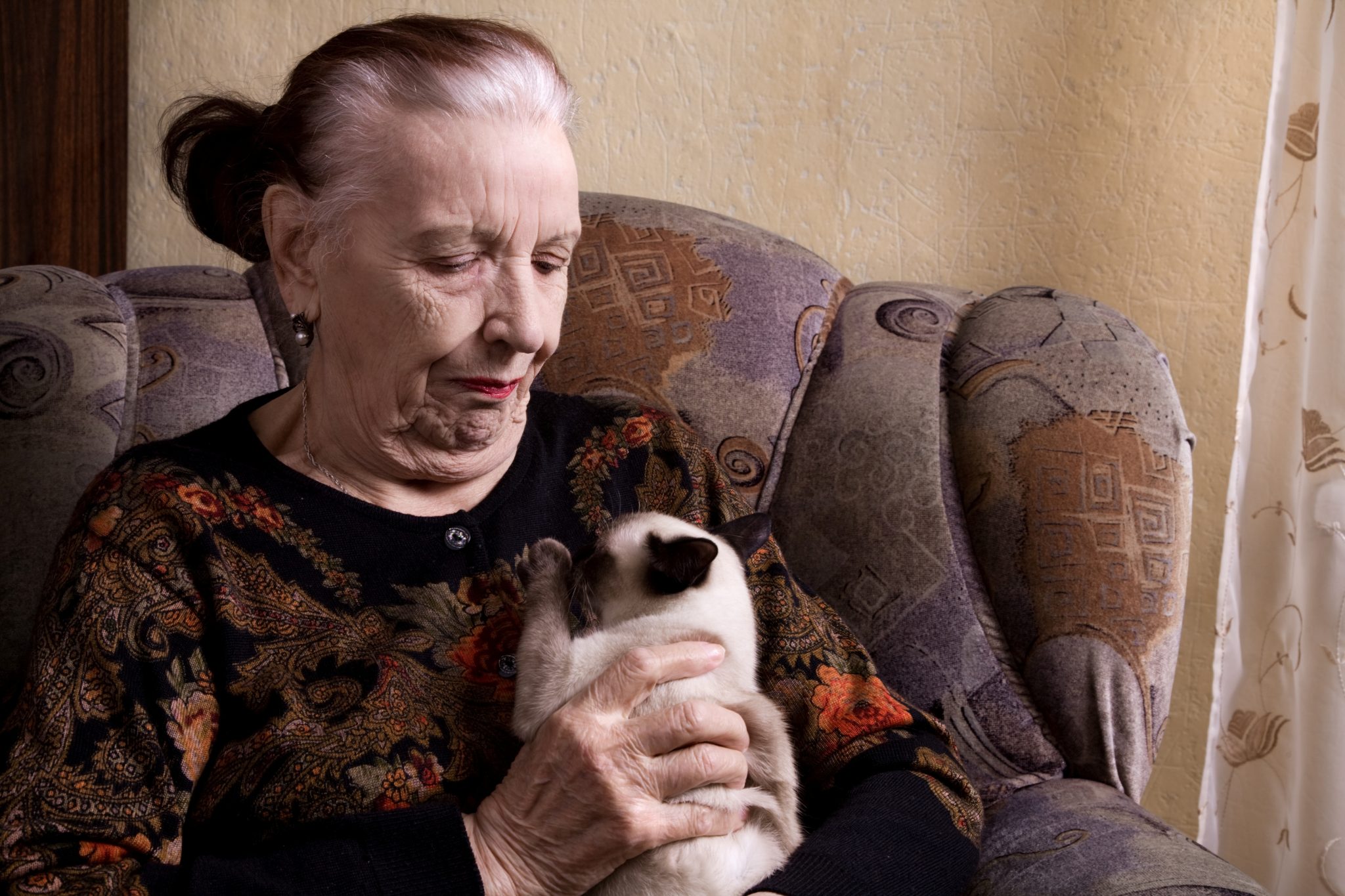There are countless benefits to owning a pet as a senior. Take a look at some of our other articles, or the linked one above from AgingCare, and you’ll see that pets can lower stress, improve immune systems, foster relationships and help you build routine. However, while many people dream of owning a dog, cat, or other adorable companion, there are some downsides to caring for an animal. While there are certainly pros and cons to everything in life, it’s important to figure out if the bad outweighs the good when making an important decision like whether or not to welcome an animal into your home.
Cost
Of course, one of the biggest considerations to make when thinking about pet ownership is the commitment you are making financially. Pets are expensive. While you might think you’re just going to be paying for some food and a few toys, even that can be pricey, and at the end of the day, there’s a lot more to owning a pet than simply buying it some food. Let’s use the costs associated with a dog, as an example:
- Food
The cost of food can vary widely, as outlined on The Dog Stop. And, while $600 a year might not seem too prohibitive, that’s provided that your dog is able to tolerate, and is interested in, the lowest quality food available. Plus, the size of your dog is also going to determine how much they eat. The reality is that many dog owners end up shelling out for much more expensive varieties in order to keep their dogs healthy and happy. Some dogs even have certain health conditions that require them to eat highly specialized diets, even more costly than the ones outlined in the link above. There’s no guarantee your dog will be able to eat the most cost-effective food, so it’s not something you can rely on.
- Training
Whether you’re getting a puppy or an adult dog, it’s very likely that they will need to visit a trainer. While this is an important part of owning a dog and will make your life much easier, it can definitely cost you. Depending on the needs of your dog, expect to spend several hundred dollars.
- Toys
Dogs are smart, and, just like humans, they need activities to keep them entertained. While you don’t need to buy your dog everything under the sun, buying toys is not just a one and done situation. It’s natural for dogs to chew their toys apart, which means constant replacement. You can opt for more expensive toys that last longer, or cheaper ones that last for less time, but either way you’ll probably spend the same.
- Supplies
Dogs need items like food and drink bowls and beds. Depending on where you live they might also require boots for outside, raincoats or cooling vests. You’ll also want to have at least one high quality leash and collar. While these items might last you a bit longer, they are still a lump sum payment that can be difficult for some people to manage.
- Registration
Most states require you to register your dog and pay a fee for a tag. While this isn’t usually a large cost, it’s still a cost to consider each year. If you don’t register your pet you could face a steep fine.
- Dog Sitting
Dogs require frequent walks and lots of attention, so if you are going away on a trip, or even if you’re gone for long stretches during the day, you’re going to need to employ the services of a dogsitter, dog walker, or kennel. While the occasional walk might be affordable, long term or specialized care can quickly add up.
- Vet Fees and Insurance
Nobody wants to think about their animal getting sick, but an unexpected illness or injury is one of the easiest ways for pet owners to go into debt or end up with the unthinkable decision of having to surrender or euthanize their pet. Costs for surgery, medication, exams and other associated costs can easily go into the thousands. And, while pet insurance is always a very good idea, many owners forgo it because of the highly monthly fees that are often a couple of hundred for comprehensive coverage. However, don’t forget that preexisting conditions aren’t covered, and there may be some other exceptions to coverage based on your dog’s age breed. Plus, even if you have good coverage, there’s also a deductible to pay, plus the cost of lost time during your day and getting your pet to and from the vet.
Of course, not every pet will incur the same costs as a dog, but you might be surprised at just how expensive even the smallest animal can be. And, if you’re thinking about adopting an animal then you should ideally aim to give it the best life possible. It might be tempting to just place a fish in a bowl, but even a goldfish deserves to have a proper water tank with plants, frequently changed and treated water, and places to hide like a pirate ship ornament. If you’re already planning on how inexpensively you can keep a pet, then having one is probably not the right choice for you.
Energy
Not only is a pet expensive, but they require a whole lot of energy! Dogs need frequent walks, cats need to be entertained with play, and even if your pet isn’t something that requires walks, you’ll still have to make sure you’re cleaning their living area regularly, which can be a workout in itself!
We know how important exercise is, and the truth is that the exercise demanded by an animal can often be very beneficial for a senior’s health. However, it’s important to consider what the needs of the prospective pet are, and whether or not you’ll be able to meet them. Daily walks might not be something you are physically capable of, and, even if you are, are you interested in three walks a day, because that might be what your pet needs! You should also think about your physical abilities when it comes to the size of your pet. Are you able to lift them if they become injured or confrontational with another animal? Again, this is not to scare you off, but just make you think about some of the realities of pet ownership. If you have hesitation, then fostering an animal might be a great option. It gives you a chance to get to know an animal before committing to it, so you can be sure that you have found a pet that you can adequately care for. You might be surprised at how energetic some animals can be. Even aside from exercise you might find their energy overstimulating and disruptive to your lifestyle.
Difficult to Find Housing
While lots of people like animals, they don’t always like animals in their space. Unfortunately this means that finding housing that accepts pets can be very difficult for renters, making the housing market that much smaller. If you think it’s likely you might move in the near future, this is something you’ll want to consider when thinking about getting a pet. You don’t want to be forced into a housing situation that’s too expensive simply because you have a pet, and it’s unfair to the animal if you have to give them up because they’re not welcome in your new home. While of course unexpected situations come up, such as illness, that’s unfortunately something that should be considered as you age. Do you have a plan in place if you’re suddenly in a position where you can no longer keep your pet? Seniors go through so many life transitions, and being forced to give up a pet can cause a lot of stress and anxiety. Sometimes the better option is making the choice to avoid pet ownership altogether.
Saying Goodbye
Many people outlive their pets, as most animals have a shorter lifespan than humans. While the joy of having a pet often outweighs the grief that might accompany their passing, it’s still something to think about. If you are already dealing with fragile mental health and have been through a lot of grief, is a pet something you are emotionally able to take on?
On the flip side, you want to consider your lifespan and health in relation to the pet. Most pets get extremely attached to their owners, and can experience grief themselves if parted from them. Is there a plan for where your pet will go if you should happen to pass before them? It might sound morbid, but this is all part of getting your affairs in order as you age. Thinking about these difficult scenarios can help you feel at peace knowing that there’s a plan in place for the animal you care for.
Restricts Your Freedom
While having a pet can be incredibly rewarding, it also requires a lot of adjustments to your lifestyle. You can’t leave pets alone all day, as it can lead to distress for the animal, and sometimes even result in destruction to your living space. This means you have to plan your outings around your pet and when they need company or walks or time outside to pee. It also means you can’t as easily plan a weekend away or go on an extended vacation. You need to make sure you have a suitable pet sitter, which might be expensive or even unavailable. Animals can greatly enhance your quality of life, but if you’re someone who likes being able to do whatever they want whenever they want then a pet might not fit in very well with that lifestyle.
Animals Can Spread Disease
Even if you’re the most diligent petowner, there’s still a chance that your pet could pick up a virus, parasite, or even bring home a tick! As the CDC says, sometimes animals can even appear perfectly healthy while carrying a disease that is spreadable. Obviously nobody wants to get sick from their pet, but seniors are even more susceptible due to their vulnerable immune systems.
Allergies
Speaking of immune systems, did you know that you can develop an allergy to your pet even if you haven’t experienced pet allergies before? Again, this might be more likely to happen to someone who is older and has a weakened immune system. If you have not experienced allergies before and are set on getting a pet then the possibility of this happening shouldn’t stop you, but it’s still something to consider when weighing all the pros and cons. No one wants to be sniffling and feeling exhausted day in and day out because of the dander from their pet!
More Cleaning
Have you ever walked into someone’s house and instantly known that they have a cat? This is likely due to someone not doing frequent enough cleanings of their cat’s litter box…ew. But sadly, a lot of people don’t clean up after their pet as often as they should. Pets require clean cages, bedding, litter boxes, scooped doo doo out on a walk….you name it. If you’re already someone who doesn’t enjoy cleaning up after themselves then will you really enjoy cleaning up after a pet? Unclean animal environments can result in unpleasant smells and even serious health hazards, so it’s something you should definitely think about before getting a pet!
It’s Risky
Did you know that over 80,000 people fall over their pets in the United States every year? Yes, you read that number right. Pets can easily get in the way of their owners and create a tripping hazard that could lead to serious injury or even death. And, because the CDC shows us that falls are the leading cause of injury for seniors each year, you can imagine that having a pet might dramatically increase the chances of having a fall. While of course it’s never intentional, it’s a scary reality, especially for seniors who might have limited mobility or vision.
Could Impact Sleep
One of the often touted benefits of having an animal is that an animal can help you build routine. But what if your animal’s routine is walking up at 4:30 in the morning, or deciding to zoom around your room at midnight? An animal moving around your home or making noise can seriously disrupt sleep, which as we all know can have detrimental effects on your health.
Tense Relationship With Neighbors
If you have a pet that makes a lot of noise or is aggressive, then it might cause tension in your relationship with your neighbors. They might get angry at a barking dog, a squawking bird or a cat that is constantly scratching the floors. Even if you work to train your animal, you don’t know quite how long that will take, and the stress could build up significantly in the meantime.
There are so many rewarding aspects to having a pet, but it’s always important to be prepared. If you are aware of all of these downsides to having a pet but feel confident that the decision is right for you then you will likely be an amazing pet owner. But if any of these points cause you to pause, then maybe you should aim to spend more time volunteering with animals or offer to walk your friend’s dog. That way you get all the benefits of pet interaction without all the commitment, and that sounds pretty good, right?








